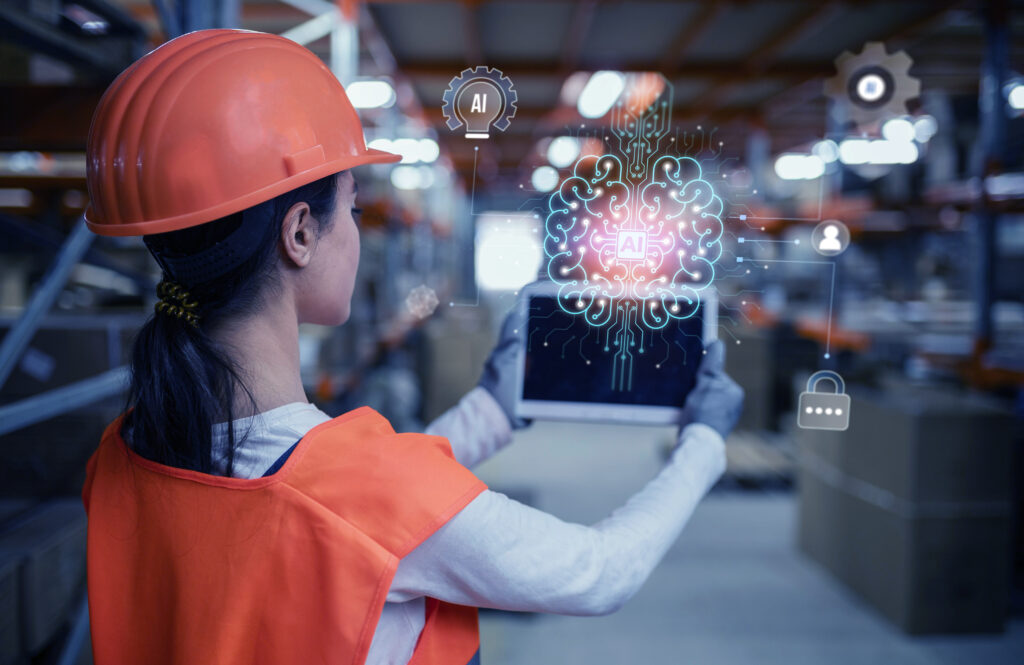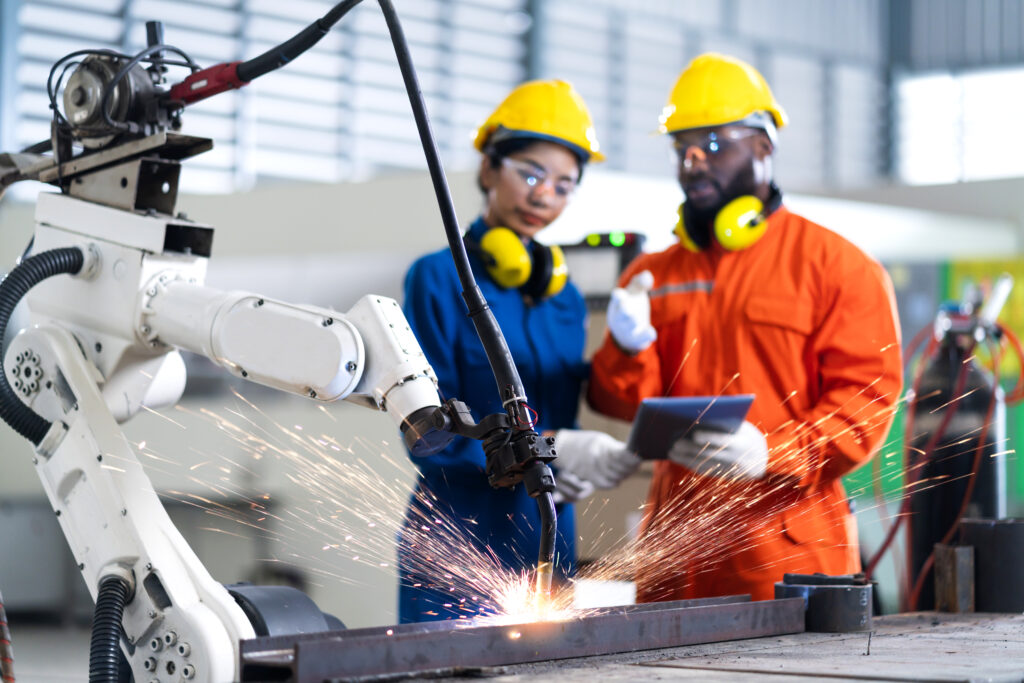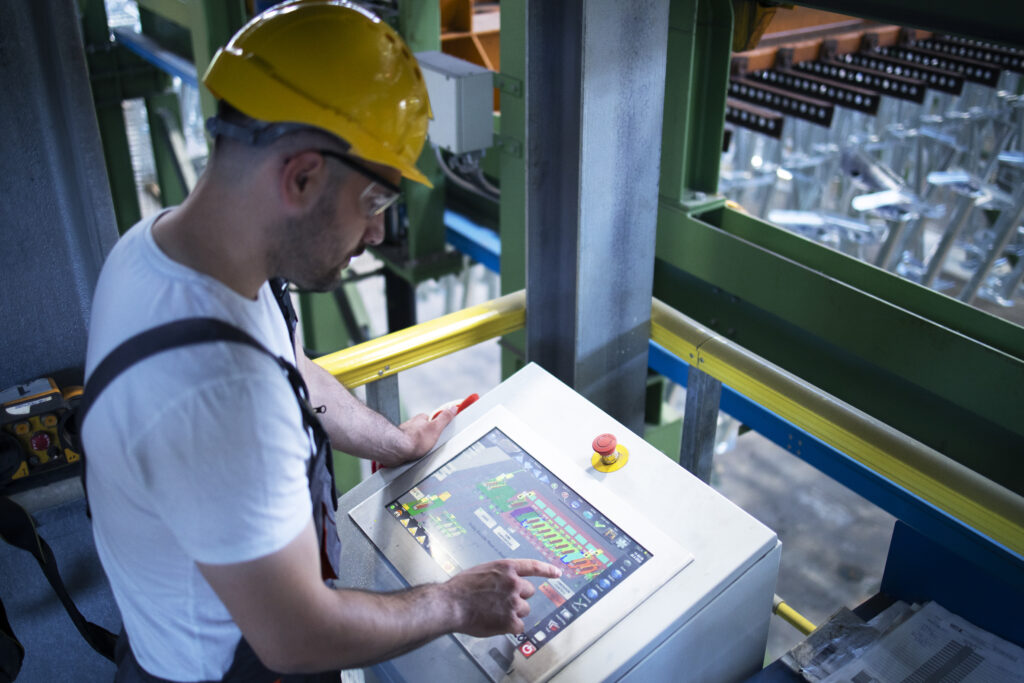I. Current State of the Manufacturing Industry
The manufacturing industry, as of 2024, is at a transformative juncture. Recent technological advancements and shifting global dynamics have radically altered its landscape. This evolution has seen a shift from traditional labor-intensive practices to more technology-driven processes. The introduction of cutting-edge technologies like AI, robotics, and IoT (Internet of Things) has not only increased efficiency but also transformed the types of products manufactured. These changes have a direct impact on manufacturing recruitment, demanding new skill sets and roles.
How Recent Trends are Influencing Recruitment
In this dynamic environment, recruitment in manufacturing faces unprecedented challenges and opportunities. Trends like automation, digitalization, and sustainable manufacturing are redefining the qualifications and skills required in candidates. This evolution requires recruiters to adapt, seeking individuals who are not just technically proficient but also adaptable to technological changes. The focus has shifted towards recruiting individuals who can work alongside advanced machinery, understand complex digital systems, and drive innovation in sustainable practices.
Understanding These Trends for Businesses and Job Seekers
For businesses, staying abreast of these trends is crucial for maintaining a competitive edge in manufacturing recruitment. It ensures access to a workforce that is skilled, innovative, and capable of driving growth in a rapidly evolving industry. Similarly, for job seekers, understanding these trends is key to remaining relevant and employable. It highlights the importance of continuous learning and adaptability in an industry that is no longer just about manual labor but about technological acumen and innovation.
II. Current Landscape of the Manufacturing Industry

A. Brief History and Evolution of Manufacturing
The history of manufacturing is a tale of continuous evolution. From the manual craftsmanship of pre-industrial times to the mass production of the Industrial Revolution, and now to the era of smart factories, the sector has always been a reflection of technological progress. Each phase brought about changes in production methods, labor requirements, and economic dynamics. Today, we stand at the threshold of the Industry 4.0 era, characterized by a blend of physical production and digital technology.
B. The Impact of Technology and Globalization
Technology and globalization have been twin drivers in reshaping manufacturing. Technological advancements like 3D printing, AI, and robotics have revolutionized production processes, making them faster, more efficient, and less reliant on human labor. Globalization, on the other hand, has expanded market reach, diversified manufacturing bases, and intensified competition. This confluence has made manufacturing recruitment a global endeavor, seeking talent that is not only technically sound but also culturally adept and globally aware.
C. Current Challenges and Opportunities
The current landscape presents both challenges and opportunities in manufacturing recruitment. On one hand, there’s a growing skills gap, as the demand for tech-savvy workers outpaces supply. On the other, there’s an opportunity to attract a new generation of workers with skills in advanced technologies. The challenge for recruiters is to bridge this gap by identifying talent that aligns with the futuristic vision of manufacturing, ensuring a workforce that is capable, innovative, and ready to tackle the demands of a digitized, globalized world.
III. Key Manufacturing Trends 2024
A. Automation and Robotics

In 2024, automation and robotics continue to lead manufacturing trends. These advancements are boosting efficiency and precision. They are reducing labor costs and improving safety. The trend is shifting the focus in manufacturing recruitment to candidates skilled in robotics and automation technologies.
Various companies in 2024 showcase how integrating robotics has enhanced their operations. These case studies illustrate the benefits of automation in manufacturing, serving as blueprints for others in the industry.
B. Sustainable and Green Manufacturing

A major trend in 2024’s manufacturing is the shift towards sustainability. Eco-friendly manufacturing practices are being widely adopted. This includes reducing waste and using sustainable materials. This trend is influencing recruitment, favoring skills in green manufacturing processes.
Sustainable practices are reshaping product design and material sourcing in manufacturing. There’s a growing preference for sustainable and recyclable materials. The impact of this trend extends to manufacturing recruitment, seeking professionals knowledgeable in eco-friendly design and sourcing.
C. Digitalization and Smart Factories
The role of IoT and AI in manufacturing is a defining trend in 2024. These technologies are central to the operation of smart factories. They enhance efficiency and enable predictive maintenance. This trend is shaping manufacturing recruitment, requiring expertise in digital technologies.
Innovations in smart factories, such as advanced sensors and interconnected systems, are standout trends in 2024. These innovations improve manufacturing processes and are driving the recruitment of tech-savvy professionals in the industry.
D. Customization and Personalization
The trend towards customization and personalization in manufacturing is strong in 2024. There’s an increasing consumer demand for tailored products. This trend is influencing manufacturing recruitment, requiring versatile and adaptable skill sets.
The move towards customized production significantly affects supply chains and logistics. It requires a more agile approach to manufacturing. This trend is reshaping recruitment in the industry, seeking professionals skilled in managing complex and dynamic supply chains.
IV. The Recruitment Paradigm Shift in Manufacturing
A. Changing Skill Sets

In manufacturing recruitment, the demand for new skills is evident. The industry now seeks expertise in robotics, digitalization, and sustainable practices. This shift is shaping the future of the manufacturing workforce.
To meet these new demands, companies are investing in training and development. Upskilling existing employees is a key strategy. Collaboration with training providers is also increasing, ensuring a workforce ready for future manufacturing challenges.
B. The Role of STEM Education
STEM education is crucial in manufacturing recruitment. It prepares the next generation for the evolving manufacturing landscape. A strong foundation in science, technology, engineering, and math is now more important than ever.
The collaboration between manufacturing companies and educational institutions is growing. This partnership ensures that the curriculum meets industry needs. It’s a strategy to prepare a workforce that is industry-ready upon graduation.
V. Strategies for Effective Recruitment in Manufacturing
A. Adopting New Recruitment Technologies
AI is revolutionizing manufacturing recruitment. It streamlines the screening and selection process. AI tools can quickly analyze resumes and match candidates with suitable roles, making recruitment more efficient.
Social media and online platforms are vital in modern recruitment strategies. They expand the reach and attract a diverse pool of candidates. Utilizing these platforms is key for successful manufacturing recruitment.
B. Building a Strong Employer Brand
A strong employer brand is essential in manufacturing recruitment. It helps attract and retain top talent. Companies with strong brands are seen as employers of choice, offering better recruitment outcomes.
Successful branding strategies in manufacturing recruitment are numerous. Case studies show how companies have used their brand to attract skilled workers. These examples serve as a blueprint for others in the industry.
C. Fostering Diversity and Inclusion

Diversity and inclusion are increasingly important in manufacturing recruitment. A diverse workforce brings varied perspectives and enhances innovation. It also reflects the global customer base of the manufacturing sector.
Best practices in inclusive hiring include unbiased recruitment processes and diversity-focused initiatives. Training hiring managers and promoting a culture of inclusivity are key. These practices not only enrich the workforce but also strengthen the company’s position in a competitive industry.
VI. The Impact of Global Trends on Local Manufacturing Recruitment
A. The Influence of Global Economic Shifts
Global economic trends significantly impact local manufacturing recruitment. Changes in international trade policies and economic conditions influence local labor markets. Manufacturers must adapt to these shifts to maintain a competitive workforce.
B. Adapting to Local Market Needs and Regulations
Local market needs and regulations shape manufacturing recruitment. Businesses must understand local labor laws and cultural nuances. Tailoring recruitment strategies to local conditions is key for success.
VII. Future Predictions and Long-Term Implications
A. The Future Landscape of Manufacturing
The future landscape of manufacturing will be technology-driven. Automation, AI, and sustainable practices will dominate. These manufacturing trends will redefine job roles and skills required in the industry.
B. Predicted Changes in Recruitment Practices
Recruitment practices in manufacturing are expected to evolve. There will be a greater emphasis on digital proficiency and adaptability. Recruitment strategies will increasingly rely on technology to source and evaluate candidates.
C. Preparing for the Future: Strategies for Businesses and Job Seekers
Businesses must invest in training and development to prepare their workforce. Embracing technology and staying abreast of manufacturing trends is vital. Job seekers should focus on continuous learning and skill development to stay relevant.
IX. Challenges and Opportunities for Recruiters
A. Navigating the Evolving Landscape
Recruiters in manufacturing face the challenge of keeping up with rapid industry changes. Staying informed about the latest manufacturing trends and adapting recruitment strategies accordingly is crucial.
B. Capitalizing on New Opportunities for Growth and Development
The evolving manufacturing landscape presents opportunities for recruiters. Identifying talent that can drive innovation and adapt to new technologies is key. Recruiters can lead the way in shaping a future-ready manufacturing workforce.
This exploration into the ever-evolving world of manufacturing and its impact on recruitment has unveiled key insights. We’ve seen how technological advancements, sustainability efforts, and global economic trends are reshaping the industry. These changes demand a new approach to manufacturing recruitment, focusing on modern skills, diverse and inclusive hiring practices, and the integration of innovative recruitment technologies.
For businesses and recruiters navigating this dynamic landscape, embracing these changes is not just beneficial but essential. Gotoros’s programmatic job advertising technology offers a cutting-edge solution in this regard. It streamlines the recruitment process, ensuring that you attract the most qualified candidates in the manufacturing sector. To see how Gotoros can transform your recruitment strategy, request a demo today.


